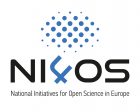Open Science, FAIR principles, EOSC and NI4OS-Europe were the focus of the event discussions

The first National Capacity Building Event for Cyprus was organized successfully by the Cyprus Institute on October 29 and 30 October, 2020. Fifty-five people registered and about thirty-four people attended this online event.
The webinar intended to inform stakeholders, researchers, and government officials about the concepts of Open Science and FAIR principles, as well as the current status of EOSC and NI4OS-Europe along with a description of their mission and principles. A thematic service from the scientific area of Digital Cultural Heritage was presented as an example of a service that will eventually be onboarded to NI4OS-Europe, along with an example of a dataset from the Climate Science field which follows the FAIR set of principles.
Dr. Chrysovalantis Constantinou opened the event with a presentation entitled “Open Science and FAIR principles”, which introduced participants to the concepts of Open Science, FAIR principles, and how EOSC and NI4OS-Europe will implement these concepts in Europe.
Mrs. Sylvia Koukounidou (University of Cyprus Library), a partner of the NI4OS-Europe project and an EOSC promoter, provided an overview of the European Open Science Cloud, the vision, the background, the governance structure and the progress with the EOSC implementation. Furthermore, Mrs. Koukounidou described the benefits each stakeholder category can have and how these stakeholders can be supported. Concluding, she described the challenges EOSC wants to address and ways with which stakeholders can contribute towards the EOSC success.
Dr. Andreas Ahtenodorou presented a talk discussing the mission and current status of NI4OS-Europe, along with a thorough overview of its structure, mission, governance, and the benefits researchers will enjoy by having their services on-boarded to NI4OS-Europe.
Mr. Iason Giraud presented a talk about the OVRET (Online Virtual Reality toolkit) service for the NI4OS-Europe services platform. The goal of the service is to provide users with the ability to use a complete spectrum of software tools, workflows, and plugins that have been organized in a step by step manner in order to create immersive environments for virtual museums, interactive collections of cultural artifacts, and visual interfaces for geolocated interaction with DCH (digital cultural heritage) assets in physical space, through mobile devices and virtual visits to inaccessible or demolished heritage monuments and historic sites.
In the last presentation, Mr. Marco Miani, a Computational Support Specialist at The Cyprus Institute (Nicosia, Cyprus), held a talk titled “Climate Data and their Visualization”. His talk addressed how, in the large-scale global climate domain, data are being generated, stored, processed, visualized, and how they intrinsically adhere to the FAIR principles. Metadata appended to the underlying numerical dataset, not only help and improve pre-, trough- and post-processing but also do make these immense sets findable, accessible, interoperable, and especially reusable (data reduction). The web-talk culminated in a demonstration of how the message encapsulated into complex climate data might be visually conveyed to an untrained, non-scientific audience, yet without sacrificing significance.
Links
